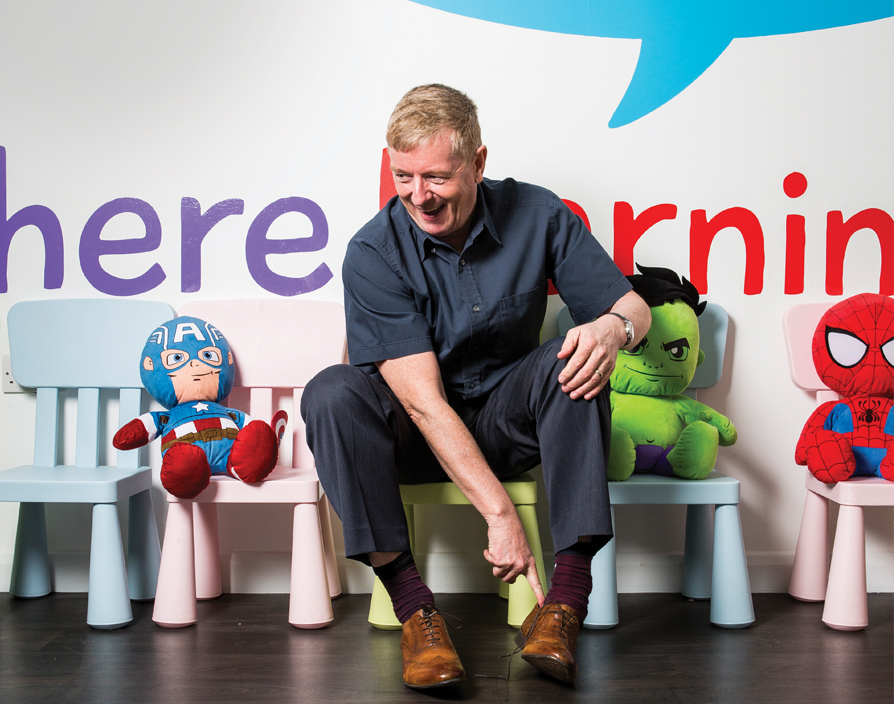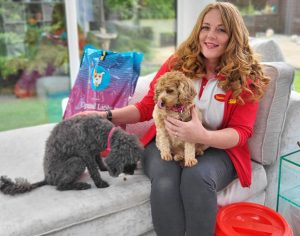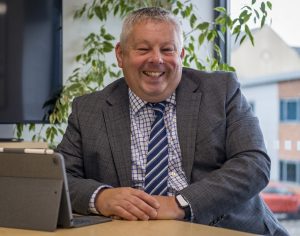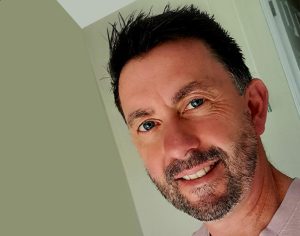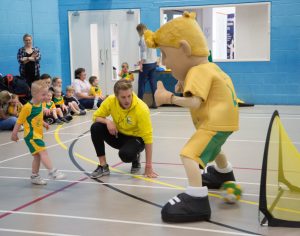Barleylands Farm Museum just outside Billericay is famous for its farmers’ markets and craft village where vendors sell everything from dog grooming and balloons to pottery and ukulele lessons. But for about a year or so the village has also hosted one of Wow World Group‘s new centres. Looking at the parents and babies coming out of the centre after enjoying a playful session full of songs and tummy time to help the kids develop, Ian Sharland, the company’s co-founder and director, smiles. “We’ve got about 35 large centres now open in the UK,” he says. These centres’ goal is to run all classes from every one of the franchisor’s brands, an impressive list including Baby Sensory, Baby Foundations, Toddler Sense, Mini Professors, KeepaBeat and Reading Fairy – all of which aim to help young children grow and learn. “We’ve been very lucky,” Sharland shrugs.
Although, the question is how much luck has played into his success given how his family early on set him upon the path towards life-long learning. “My grandmother spent a lot of time doing jigsaw puzzles with me and my father gave me a keen inquisitive interest into how things work,” Sharland remembers. Surprisingly, his teachers from the small primary school in Dunsford who saw to his formal education were far from delighted about his constant questioning about why things were the way they were. “They would always say ‘shut up Sharland, you’re interfering,'” he laughs.
Discontent with simply learning cold facts without much context, at the age of 16, Sharland had had his fill of school and wanted to drop out to find a job. “My dad didn’t want me to so he said, ‘I’ll tell you what, I’ll get you a job you can do for the next six weeks,'” Sharland says. The work in question was working for a pest control firm. “He got me this really unpleasant job and I’m sure dad told the guys I worked with to give me a really tough time because they kept sending me underneath the floor to spray for wood worm and I hated it,” he says. “I learned that there were more unpleasant things than going back to school.” With this life lesson tightly tucked underneath his belt, Sharland went back to finish his A levels at Exeter Technical College.
Following his education, Sharland believed technology was the industry of the future. “So I got a job with a local computer bureau,” he says. Contrary to working with the pest control firm, signing the dotted line to join Western Data Processing in 1977 gave him a sense of fulfilment that prompted him to stay with the company for over two decades as it was sold, merged and grown with other businesses. “I basically stayed with it until the early 2000s,” he says.
And young Sharland quickly proved his business chops. “I was promoted fairly quickly and when I was about 21 or 22 I’d become an operations manager looking after roughly 24 staff,” he says. And this upward trajectory continued when the company was bought by BARIC Computing, which was owned by Barclays. Sharland was given two options following the acquisition: accepting a hefty redundancy payment or moving with the company to London and taking on a more customer-facing role. He chose the latter. “It was probably a stroke of luck because I was then given the job to manage accounts like BP and Legal & General,” he says.
Not only was this a chance for him to try his hand at something new but it also provided valuable lessons. “Probably one of the most influential people I’ve ever worked with was a guy named Jack Wratten who worked with BP as their company registrar,” Sharland says. From very early on his objective was to sell additional services to BP, which Wratten didn’t have a problem with. The extra paperwork was another question entirely. “He took me aside and said ‘if you come to me with a little bill every time you want to do something slightly different, then I’m going to get bored and we’ll fall out,'” Sharland remembers. “‘Instead,’ he said, ‘I would much rather we behaved in a grownup manner and that you’ll every so often bring me a big bill for doing a lot of things. That’s going to be much more efficient for getting the paperwork done.'” The lesson: move fast and don’t get held up by the little things.”
With this relationship in the bag, BARIC Computing, now a part of CMG, had everything it needed to grow at a tremendous speed. But the expansion came at a price. “There was one very harsh lesson that I learned,” Sharland says. “We were a small player in the share registration market but by dealing with BP as customer we grew a successful business offering our services to companies like Guinness, Grand Metropolitan, Legal & General, you know – really big household names. And we got to the point where we’d become a problem to more established players.” One of the competitors was Lloyds. “Overnight they did a fantastic deal with BP, stole our foundation and undermined five years of hard work that me and my team had put in to build a strong business,” he says. “They were simply bigger and more powerful than we were.”
Despite having gone through the biggest low point of his career, CMG recognised the failure hadn’t been Sharland’s fault and could’ve happened to anyone. Thankfully,” he could stay on, which luckily meant that he’d be assigned to a job in Wales a few years later. “And it was there that I met Keeley,” he says. “It was probably the best order we ever took.” Although, his future wife and business partner confesses that she initially was annoyed by this Exeter guy who came in to teach her to streamline processes. Her, the queen of streamlining. “That was what she called herself,” Sharland laughs. Eventually, after weeks working together, that vexation turned to affection.
By 2005 Sharland felt he’d had his fill of working with CMG, left the company and began looking for his next adventure. The solution to the problem arrived when he took on an interim role as managing director at a recruitment publishing company. “One of the guys there, Nick, said his mother had a great idea,” Sharland says. “He saw that I liked to develop businesses and suggested that I should meet her.” He accepted and the following Sunday doctor Lin Day and her husband Howard came to visit the Sharlands’ house to present the concept that would become Baby Sensory. She showed and explained the concept behind the classes she’d been running for four years. While Sharland was intrigued by how songs and playtime could help babies develop, he was initially quite sceptical. “I thought, if you put 20 babies in a room and one starts crying, surely it will set everyone off,” he says.”
Still, Keeley was intrigued and went to a class. “She came home and said that it was amazing and ‘you better come with me next time,'” Sharland remembers. When he did, he was stunned to find that not only did none of the children cry but also that babies as young as six months old were actively engaging with the lessons in a way he’d never imagined before. “Seeing these babies being so comfortable with each other and enjoying each other’s company and interacting with one another and with their parents, I thought it was really interesting,” he says. Sharland was so impressed that he agreed to help transform the brand into a business.
Having signed a shareholder agreement, their first order of business was to turn the Baby Sensory concept into a franchise. “I’d learned from my earlier experience that you’ve got to become the biggest player on the playground quickly,” Sharland says. Another reason was that franchising would enable the company to recruit highly passionate and motivated people to run the business. “There’s nothing more empowering than feeling that if you work hard you are growing a business for yourself,” he says.
No matter what industry you’re in, no franchisor can be successful without a replicable model for franchisees to follow. But creating one would prove a challenge. “Lin was incredibly creative and an amazing class leader,” he says. “But the thing that kept us awake at night was how we could create a training programme that would allow people to replicate Lin in the classroom.” To solve this dilemma, the founding team decided to do two things: have Day write 40 lesson plans and to recruit her daughter-in-law Lucy as the company’s pilot franchisee. This enabled them to write a lesson plan and get immediate feedback that they could adjust to. It didn’t take long before the new franchisee had over 70 babies attending her classes. “Not only was it working but it proved very popular with customers,” Sharland smiles.
With this roaring success under its belt the franchisor decided to recruit its first batch of franchisees, using a combination of newspaper ads and talking with clients. However, getting the new members of the network up to speed wasn’t without its difficulities. “We recognised early on that some franchisees buy a franchise, thinking it will be easy because they buy into a model that someone else has been testing,” he says. “Whereas that’s true up to a point, whenever you’re launching any business it involves a lot of work.”
Unfortunately, the franchisor quickly noticed that far from everyone was ready to do the time or had the proclivities necessary to run a business. “There are some people out there who, when faced with a problem, look for a way to solve it and there are others who’d basically just ask us to solve it for them,” he says. While he recognises that franchisors should support franchisees, he’s adamant that some people’s tendencies to whine rather than solve issues meant they couldn’t efficiently grow the business. The solution was to add a new criteria to look for in the candidates wishing to join the network. Previously the franchisor had looked for natural performers who could lead the classes, promote their business, were passionate about customer relationships and loved teamwork. Now, armed with the failures from their first batch, the co-founders added being a problem-solver to the list. “If you don’t have any of these competencies then it may be a mistake for you to run your own business,” says Sharland.”
Having tended to these teething problems, Baby Sensory successfully grew over the following four years. However, as the business grew, so did the babies. “We had a lot of franchisees telling us they hated to lose customers just because they were 13 months old,” he says. To overcome this hurdle, the franchisor decided to launch a second franchise based on another of Day’s programmes aimed at slightly older kids: Toddler Sense. The launch plan essentially followed the one of Baby Sensory, with the good doctor developing lesson plans and having her daughter Katie trialling it. Today, one in 20 babies born in the UK go to Baby Sensory classes and roughly one in 50 attend Toddler Sense sessions. “So it’s a decent market share,” says Sharland.
Another huge development was that Baby Sensory began to spread across the world. The first expansion came when a woman from Italy wanted to launch a Baby Sensory franchise in the Mediterranean country in 2008. “It was a massive challenge because it was a completely different market with a different culture and parents who weren’t used to going to classes,” Sharland says. Nevertheless, the franchisor said yes and when it proved relatively successful, other international markets soon followed. “Our most successful overseas countries have probably been Australia and New Zealand,” he says. Today the Wow World Group has franchisees in over 30 countries.

Eric Johansson
As web editor and resident Viking, Johansson ensures Elite Franchise is filled with engaging and eclectic entrepreneurial stories. While one of our most prolific franchise writers, he has sharpened his editorial teeth by writing about entertainment and fitness. Follow him on Twitter at @EricJohanssonLJ to catch up with his stream of consciousness.

Eric Johansson
As web editor and resident Viking, Johansson ensures Elite Franchise is filled with engaging and eclectic entrepreneurial stories. While one of our most prolific franchise writers, he has sharpened his editorial teeth by writing about entertainment and fitness. Follow him on Twitter at @EricJohanssonLJ to catch up with his stream of consciousness.
